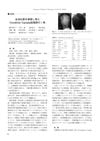 1 citations,
August 2018 in “bioRxiv (Cold Spring Harbor Laboratory)”
1 citations,
August 2018 in “bioRxiv (Cold Spring Harbor Laboratory)” A new mutation in the TMEM173 gene and a risk allele in IFIH1 cause a unique set of immune-related symptoms.
 1 citations,
June 2010 in “Expert Review of Dermatology”
1 citations,
June 2010 in “Expert Review of Dermatology” Covers common skin issues in kids, their diagnosis, treatment, and need for specialist care.

Acitretin treatment unexpectedly darkened a patient's gray hair.
 81 citations,
July 2012 in “Translational Psychiatry”
81 citations,
July 2012 in “Translational Psychiatry” Memantine may slightly improve memory in people with Down syndrome, but more research is needed.
 47 citations,
July 2014 in “European Journal of Pharmaceutics and Biopharmaceutics”
47 citations,
July 2014 in “European Journal of Pharmaceutics and Biopharmaceutics” Scientists created a gel with nanoparticles to deliver medicine to hair follicles effectively.
 42 citations,
April 2021 in “Journal of clinical pharmacology”
42 citations,
April 2021 in “Journal of clinical pharmacology” Baricitinib helps treat several diseases, including COVID-19, but has side effects and needs careful monitoring.
 35 citations,
May 2008 in “Journal of Clinical Oncology”
35 citations,
May 2008 in “Journal of Clinical Oncology” A cancer patient died from a severe skin reaction after taking the drug cetuximab.
 25 citations,
December 2008 in “The Journal of Urology”
25 citations,
December 2008 in “The Journal of Urology” Short-term finasteride treatment may lower some cell death factors in prostate cancer cells.
 23 citations,
December 2004 in “Seminars in oncology”
23 citations,
December 2004 in “Seminars in oncology” Liposomal anthracyclines are effective and safer for treating multiple myeloma, especially in elderly patients.
 19 citations,
October 2013 in “Headache: The Journal of Head and Face Pain”
19 citations,
October 2013 in “Headache: The Journal of Head and Face Pain” The document concludes that inhalation of oxygen and sumatriptan injections are primary for cluster headaches, indomethacin for paroxysmal hemicrania, and lidocaine and lamotrigine for SUNCT, but SUNCT often resists treatment.
 13 citations,
December 2014 in “Stem Cells”
13 citations,
December 2014 in “Stem Cells” Hair and skin can regenerate without bulge stem cells due to other compensating cells.
 10 citations,
October 2014 in “Journal of Ovarian Research”
10 citations,
October 2014 in “Journal of Ovarian Research” The IRS-2 Asp/Asp genotype may increase the risk of PCOS in Chinese women, especially if they are not obese.
 9 citations,
April 1987 in “International Journal of Dermatology”
9 citations,
April 1987 in “International Journal of Dermatology” Stopping the depression medication improved the woman's eyebrow hair loss, and a treatment for a skin condition caused by mites was effective.
 5 citations,
March 2023 in “bioRxiv (Cold Spring Harbor Laboratory)”
5 citations,
March 2023 in “bioRxiv (Cold Spring Harbor Laboratory)” Dynamic, light touch is sensed through a common mechanism involving Piezo2 channels in sensory axons.
 5 citations,
March 2021 in “International Journal of Dermatology”
5 citations,
March 2021 in “International Journal of Dermatology” Biotin supplementation during isotretinoin treatment for acne may help maintain skin hydration and improve hair growth.
 4 citations,
September 2006 in “European Journal of Clinical Pharmacology”
4 citations,
September 2006 in “European Journal of Clinical Pharmacology” Finasteride doesn't affect omeprazole metabolism in Japanese people.
 August 2023 in “Research Square (Research Square)”
August 2023 in “Research Square (Research Square)” Personalized thiopurine dosing based on NUDT15 genotyping can improve long-term outcomes for ulcerative colitis and Crohn's disease patients.

The document is a guide for practitioners to successfully perform hair transplants using the FUE method.

TLR3 signaling enhances the immunosuppressive properties of human periodontal ligament stem cells.
 January 2014 in “Progress of Digestive Endoscopy”
January 2014 in “Progress of Digestive Endoscopy” Prednisolone improved symptoms in a woman with Cronkhite-Canada syndrome, but regular screenings are needed due to cancer risk.
 January 2008 in “Annals of Nutrition and Metabolism”
January 2008 in “Annals of Nutrition and Metabolism” Parthenolide promotes hair growth in mice and may influence pathways related to male pattern baldness.
 1054 citations,
February 1998 in “The New England Journal of Medicine”
1054 citations,
February 1998 in “The New England Journal of Medicine” Finasteride reduces urinary issues and surgery need in men with enlarged prostates by over 50%.
 180 citations,
July 1973 in “The New England Journal of Medicine”
180 citations,
July 1973 in “The New England Journal of Medicine” Minoxidil effectively lowers blood pressure with few side effects.
 119 citations,
October 1992 in “Fundamental & Clinical Pharmacology”
119 citations,
October 1992 in “Fundamental & Clinical Pharmacology” Potassium channel openers could help treat cardiovascular diseases and asthma but require better targeting to specific tissues for effective use.
 95 citations,
November 2018 in “Australasian journal of dermatology”
95 citations,
November 2018 in “Australasian journal of dermatology” Alopecia areata treatment varies, with no optimal method established yet.
 62 citations,
December 2013 in “Aaps Journal”
62 citations,
December 2013 in “Aaps Journal” Squarticles effectively deliver hair growth drugs to follicles and dermal papilla cells.
 53 citations,
July 2011 in “Biomaterials”
53 citations,
July 2011 in “Biomaterials” Human liver cells stick to hair protein materials mainly through the liver's asialoglycoprotein receptor.
 39 citations,
November 2015 in “Nanomedicine”
39 citations,
November 2015 in “Nanomedicine” Improved Finasteride delivery for hair loss treatment.
 35 citations,
January 1996 in “Dermatologic clinics”
35 citations,
January 1996 in “Dermatologic clinics” Tinea capitis is a common scalp infection causing hair loss, mostly in young children.
 32 citations,
January 2018 in “American Journal of Clinical Dermatology”
32 citations,
January 2018 in “American Journal of Clinical Dermatology” Hormone therapy affects hair growth in transgender individuals, with testosterone potentially causing hair loss in trans men and estrogen reducing facial/body hair in trans women; treatment options vary.






























